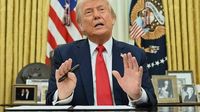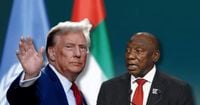In a significant shift in international trade dynamics, South Africa is grappling with the implications of new tariffs imposed by the United States, which have sent shockwaves through its economy and raised concerns about a potential trade war. The tariffs, announced by President Donald Trump on April 2, 2025, during what he termed "Liberation Day," impose a baseline 30% tariff on all South African exports to the U.S., affecting a wide range of goods and services.
South Africa's trade minister, Parks Tau, emphasized the country's hesitance to retaliate with counter-tariffs, stating, "It’s a risky thing to do to simply decide that we’re now going to impose reciprocal tariffs. I think it is a race to the bottom." This sentiment reflects a broader concern that such actions could further destabilize trade relations and harm the South African economy, which is already facing significant challenges.
The new U.S. tariff policy affects over 180 countries worldwide, with South Africa being one of the hardest hit. The tariffs are part of a sweeping strategy aimed at addressing perceived unfair trade practices, including foreign tariffs and currency manipulation. In addition to the baseline tariffs, the U.S. has also targeted countries it deems "worst offenders," such as Nigeria and South Africa, with even higher rates.
As reported by Bloomberg, Tau noted, "We have in excess of 600 U.S. companies that are in South Africa — we’re not going to wake up one day and say we want to target U.S. companies, it would be counterproductive." This highlights the complex interdependence between the two nations, as South Africa seeks to maintain its economic ties while navigating the fallout from U.S. trade policies.
International Relations Minister Ronald Lamola echoed these concerns, stating that punitive tariffs "are a concern and serve as a barrier to trade." He reaffirmed South Africa's commitment to a mutually beneficial trade relationship with the U.S., despite the current tensions.
The backdrop of these tariffs is a fraught relationship between the U.S. and South Africa, exacerbated by Trump's previous criticisms of the country's land reform policies and his administration's suspension of USAID, which has affected several African nations. The South African government has defended its land reform efforts as constitutional and aimed at rectifying historical injustices.
In the wake of Trump's announcement, South African President Cyril Ramaphosa expressed a desire to ease tensions, emphasizing the importance of diplomatic relations. He stated, "We don't want to go and explain ourselves. We want to go and do a meaningful deal with the United States on a whole range of issues." This reflects a strategic pivot towards negotiation rather than confrontation.
The tariffs are set to take effect on April 5, 2025, with reciprocal tariffs for countries with significant trade deficits scheduled for April 9. Analysts warn that these changes could jeopardize the African Growth and Opportunity Act (AGOA), a trade framework established in 2000 that has allowed African countries to export goods to the U.S. duty-free, thereby supporting job creation and economic growth.
Lesotho, another Southern African nation, faces particularly harsh tariffs of 50% on its exports, further complicating the economic landscape. Lesotho's economy heavily relies on textile exports to the U.S., which account for a substantial portion of local employment. Leseko Makhetha, head of the economics department at the National University of Lesotho, stated, "The new 50 percent tariff will make it very difficult for us to be competitive, which means that 40,000 jobs are at risk." This scenario underscores the potential for widespread economic disruption across the region.
Experts predict that the tariffs will force African nations to seek alternative trading partners, particularly China, which has emerged as a dominant player in African trade. For nearly two decades, China has surpassed the U.S. as Africa's top trading partner, importing primary goods and exporting finished products back to the continent.
As the situation continues to evolve, South Africa is actively seeking to negotiate a new bilateral trade agreement with the U.S. to secure long-term trade certainty. The South African presidency has called for urgent discussions with Washington, emphasizing the need for a mutually beneficial arrangement.
Oscar van Heerden, a senior research fellow at the Centre for African Diplomacy and Leadership at the University of Johannesburg, remarked on the potential for significant economic consequences, stating, "The impact of this new tariff regime is going to be very bad. Everyone is now going back to the drawing board to understand what precisely are the financial implications." He suggested that Trump's strategy appears to be one of disruption, aimed at forcing negotiations that could lead to concessions on various issues.
In conclusion, the implications of Trump's tariffs on South Africa are profound, threatening to unravel decades of trade relationships and economic stability in the region. As South Africa navigates these challenges, the focus will remain on fostering dialogue and seeking solutions that prioritize economic growth and mutual benefit.






